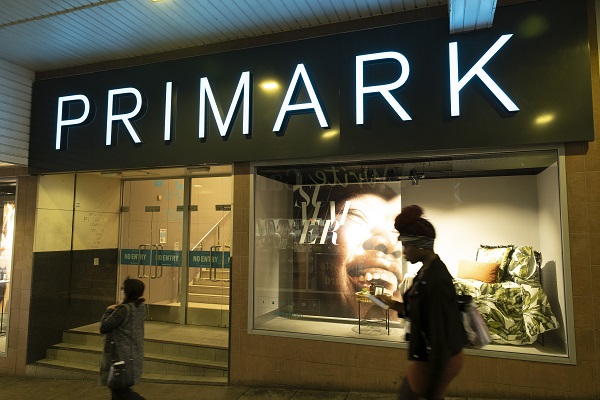Why AB Foods is predicting ‘meaningful progress’ in 2024
While Primark remained the engine of growth during the FTSE 100 firm's first quarter, other parts of the business will be chipping in this year too.
23rd January 2024 08:21
by Richard Hunter from interactive investor

Primark remains the engine of growth for Associated British Foods (LSE:ABF), with its value offerings still hitting the spot with an increasingly cost-conscious consumer.
Despite a slow start to the first quarter of its financial year given some unseasonably warm weather, Primark was back with a bang for Christmas. Womenswear and menswear were particularly strong, with the Christmas ranges proving popular. Revenues excluding currency effects grew by 7.9% in the 16 weeks to 6 January, with Primark now representing 49% of group sales.
At the same time, selective price rises also provided some margin protection, and in terms of outlook, the group is maintaining its projection for adjusted operating margin in excess of 10%, with the potential for more should this rate of growth be maintained.
- Invest with ii: Open a Stocks & Shares ISA | ISA Investment Ideas | Transfer a Stocks & Shares ISA
Primark continues to receive care and attention from the business which is enabling its growth. The online offering was recently upgraded, where enhancements to its website and a controlled roll-out of a trial “Click and Collect” service showed some early signs of success.
Elsewhere, Primark continues to expand its footprint and this quarter opened further stores in France, Spain and Poland. There were also three stores added in the potentially rewarding US market, where the offering appears to growing at a fair clip. US sales grew by 45% in the quarter, largely driven by store openings, and the group remains upbeat around longer-term prospects for the region.
At this stage, AB Foods expects the impact of events in the Red Sea to have limited disruption to its supply chain and will monitor the situation. In the meantime, the group has pointed out that the improvement in product margin which Primark is currently enjoying should insulate the group against the costs of such supply chain disruptions, should they arise.
Stock levels are currently in a healthy position and the store opening programme and incremental improvements to its offering, particularly online, offer an enticing glimpse into what could be another year of strong recovery at the retailer, where so many competitors are finding the going increasingly tough.
An unusual feature of the group is the diverse range of businesses which it houses, which allows not only for business and geographical diversification, but also for various units to pick up some of the slack elsewhere in the business depending on the economic cycle. This was of particular benefit during the pandemic when Primark was all but shuttered, and now that the retail arm is back on track slight pockets of weakness in the Agriculture and Ingredients units are being compensated for across the remaining lines.
- 2024 Investment outlook: share tips, forecasts, tax, pensions and savings
- DIY Investor Diary: the four funds I picked to start my ISA
- The UK stock market outlook for 2024
Aside from Primark, Grocery saw revenues increase by 5.4%, which is a notable contribution given that the unit accounts for 20% of group sales. US based sales were strong, as was the Ovaltine contribution in Western Europe which helped offset some weakness in Asia.
Elsewhere, the expected bounce in production levels is gaining pace, boosting revenues in the Sugar unit by 13%, which is another large strand of the group which represents 12% of overall revenues.
The group’s reiteration of previous guidance, especially for margin, will provide some comfort for investors. At the same time, the diversified nature of the AB Foods business offers some insurance against most economic outcomes, while at the centre of the current success is a Primark business which continues to flourish both home and abroad.
It said today: "The group continues to trade well. We continue to look forward to a year of meaningful progress in both profitability and cash generation, with the profitability improvement being driven by a recovery in Primark margin, a marked improvement in British Sugar profitability, and by reduced losses at [bioethanol producer] Vivergo."
- Jeff Prestridge: these funds are robust long-term pillars of an ISA
- Insider: three chiefs buy this bombed-out FTSE 100 share
- ii view: retailer Next optimistic about 2024
The shares have certainly reacted to the more recently positive noises coming from the company, with the price having risen by 24% over the last year, as compared to a decline of 3.8% for the wider FTSE 100.
The projected dividend yield of 2.7% remains pedestrian rather than attractive, although an underlying share buyback programme should offer some support.
The final piece of the jigsaw has yet to emerge in terms of an upgrade to the current market consensus, which is a 'strong hold'. However, given clear growth prospects, easing inflation and an undemanding valuation by historic standards, this could yet follow.
These articles are provided for information purposes only. Occasionally, an opinion about whether to buy or sell a specific investment may be provided by third parties. The content is not intended to be a personal recommendation to buy or sell any financial instrument or product, or to adopt any investment strategy as it is not provided based on an assessment of your investing knowledge and experience, your financial situation or your investment objectives. The value of your investments, and the income derived from them, may go down as well as up. You may not get back all the money that you invest. The investments referred to in this article may not be suitable for all investors, and if in doubt, an investor should seek advice from a qualified investment adviser.
Full performance can be found on the company or index summary page on the interactive investor website. Simply click on the company's or index name highlighted in the article.